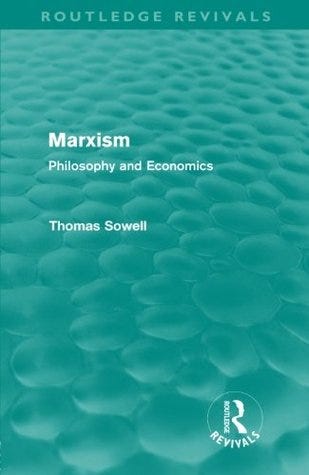Marxism: Philosophy and Economics
Sowell, Thomas. (New York: Routledge, 2012)
Proponents of Marxism today often claim that self-proclaimed Marxist political systems in history were not really Marxist; they were corruptions of Marx’s original philosophy. The thing is, however, that this is not entirely false. Marx’s writings contain enough contradictory material to justify the more “conservative” classical Marxist interpretation of Marx, as well as the “radical” interpretations of Marx. How, then, are we to understand Marx’s philosophy overall?
In his book Marxism: Philosophy and Econpmics, Thomas Sowell helpfully gives a detailed account of Marx’s philosophical foundation, economic theory, and the various evolutionary development in Marx’s thinking that took place over the course of his life. This ten chapter book is largely accessible, explaining Marx’s dialectical approach, his philosophy of materialism (rooted in Epicureanism), his theory of history, the Marxist definition of capital, critique of capitalism, and his fluctuating views on the legitimacy of the use of violence to achieve a communist utopia. Moreover, Sowell also gives a brief biographical sketch of Marx, a historical account that helps flesh out the ways in which his thinking is tied not only to his life but to that of his successors, albeit through the mediation of his writings.
Ultimately, one walks away from this well documented book with a better understanding of Marx and his philosophy, as Sowell presents Marx neither as cartoonishly villainous, or as a philosophical saint. He underscores the philosophical problems with Marxism, as well as its failure to deal with the actual economic issues of his day, let alone the economic issues that would be raised soon after his death. Sowell underscores the holes in Marx’s thinking that have allowed others to fill in the details in ways with which Marx, perhaps, may not have agreed.
What this results in is an understanding of Marxism as a system of thought that was originally intended to be humanistic in its origin, a social theory that has much in common with various neo-”conservative” movements now emerging in the West. Sowell’s book is important for the reader who is concerned with the current direction being taken by world leaders following the “Great Reset” agenda set forth by Klaus Schwab and the World Economic Forum, but who sense that there is something awry in the thinking in some of the larger opposition parties that are on the supposedly “conservative” side.
While portions of this book are dry, as they are covering economic theory, they nevertheless contain invaluable information. If you want to understand Marxism, this book is a great, concise, and information packed place to start.
—h.



